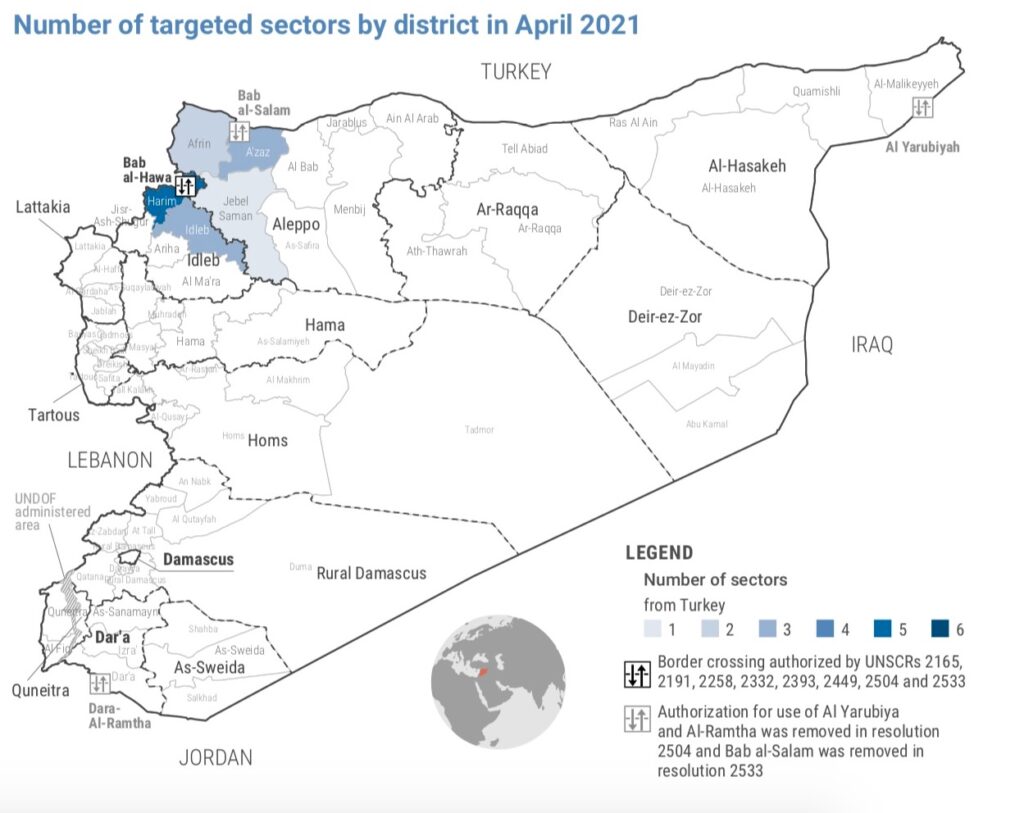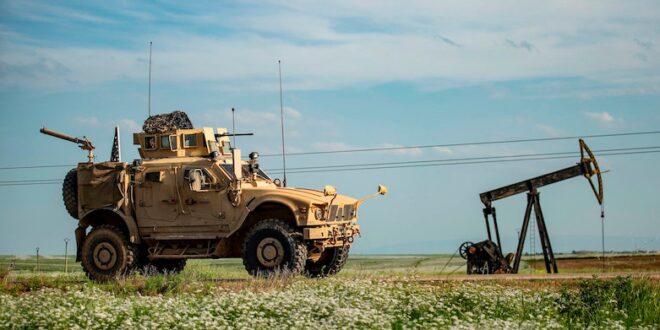The Biden administration’s apparent decision to pull a license for a US company to operate in oil fields in northeast Syria is grounded in the hope that it can negotiate with Moscow on two key aid channels into the country in exchange for pulling out of the oil fields, sources have told Kurdistan 24.
Two sources in the northeast Syrian city of Qamishlo familiar with the contract said Russian oil companies are already contracted to work in Syria and are looking to move into the area that would be operated by Delta Crescent Energy, an American company licensed to operate in the northeast under an Obama-era policy. The sources requested not to be named in order to discuss sensitive agreements.
The decision not to renew the license – which is legally required for an American company doing business in Syria – was first reported by Al-Monitor on May 21.
DCE was formed in 2019 by a retired Delta Force Army officer, Lt. Col. James Reese, along with an ex-ambassador to Denmark, James Cain, and John Dorrier, an industry veteran and former chief executive of UK-based Gulfsands Petroleum Plc.
The company applied for the Syria license in 2019. It was granted in 2020, when Donald Trump was president, and first publicly revealed in a Senate hearing in July that year.
A DCE source told Kurdistan 24 on Friday that “the OFAC license was extended on 29 April 2021 to 31 May 2021,” referring to the US Treasury Department’s Office of Foreign Assets Control. “We are waiting on confirmation the license has been renewed for a period of 1-2 years,” the source said. “We have received no ‘wind down’ notice from OFAC or the State Department.”
A spokesperson for the US Department of State declined to comment “on whether private companies have authorizations or licenses.” The Treasury Department did not respond to a request for clarification on DCE’s current status.
Despite announcing the withdrawal of US forces from Syria in October 2019, Trump in the end left a few hundred troops in northeast Syria “where they have the oil” to prevent ISIS from retaking oil fields and the Assad government and its ally Iran from profiting from energy sales.
“My understanding is that the decision has not been finalized but that at the highest level of the Biden team they are unhappy with the ‘take the oil’ optics of what they view as a Trumpian resource grab in Syria that is off-brand for Biden’s foreign policy messaging,” said Nicholas Heras, a Senior Analyst and Program Head for State Resilience and Fragility at the Newlines Institute in Washington, DC.
“There is a chance the waiver gets extended for a month to allow the Syria policy review to finish up,” Heras told Kurdistan 24 on Thursday.
Some Russian companies have been contracted to work in Syrian oil fields since the 1990s under deals with the Syrian government, the sources in Qamishlo said.
Those contracts haven’t expired, and Moscow is looking to move into oil fields in territory partly run by the Autonomous Administration of North and East Syria, the civil administration tied to the Syrian Democratic Forces.
“An American company cannot operate there for risk of being sued,” one source in Qamishlo said, as the Biden administration does not want to confront Moscow or face an international lawsuit.
The DCE source said the area had been abandoned by the Syrian regime early in the civil conflict and local people were left to defend the area against ISIS.
“DCE has contracts in place in Rojava that cover oil and gas trading and marketing internationally, field redevelopment and refining. These contracts contain exclusivity for the contracts. We are not aware of any current Russian contracts for these activities,” they said.
Disputing reports that the company has done no practical work in the country, the source said “DCE has begun some physical operations with installation of some production related equipment in April 2021. Production of fields has been ongoing for years, without DCE’s involvement.”
One of the Qamishlo sources identified the Russian companies with contracts in the country as Mercury LLC and Velada LLC. Both were reportedly awarded Syrian government contracts for oil exploration in three blocs in 2019, including one oilfield in the northeast. One field in bloc 7, awarded to Mercury LLC, covers an area of 9,531 square kilometers.
Mercury and Velada have ties to a man known as “Putin’s chef” – Yevgeny Prigozhin, who is close to Russian President Vladimir Putin and whom the US indicted in 2018 over his alleged involvement in Moscow’s meddling in the 2016 US presidential elections.
Prigozhin himself is widely accepted to be the man behind the Russian paramilitary company PMC Wagner Group, whose mercenaries were killed by the hundreds in a US airstrike near the Conoco gas field in SDF-controlled Deir al-Zor in 2018.
A third Russian company, TATNEFT, was awarded a Syrian government contract in 2005 to operate in the whole of the country. Although it suspended operations in 2011, citing the war, its chairman told Russian state media last year that the company is examining a return to exploration in Syria. The company did not respond to Kurdistan 24’s request for comment ahead of publication. A spokesperson for Mercury LLC could not be reached.
If DCE, the only American company with an OFAC license in Syria, is forced to leave it could open the door to Russian dominance over Syria’s oil sector.
The DCE source explained that the company has “no unilateral operations” in northeast Syria and is in fact “subordinate to the Jazeera Oil Company, the national oil company of Rojava,” the area of northeast Syria under Kurdish control.
“Under a Production Sharing Contract with DCE, the day-to-day operations of the field development and production come under supervision of a Joint Operating Company that is managed by both parties,” they said.
“This structure is embedded in every Production Sharing Contract in Syria, so this operation would work very much like every other operation in the country that involves foreign company operators.”
Unlike Russian companies that bring in their own personnel when they operate abroad, the DCE contact uses “the current JOC subject matter experts, local labor and local companies to the maximum extent possible,” the company source said.
“Simply put, this promotes local economy and capacity growth, both of which we support. Our OFAC license submission stated our mission in [northeast Syria] is to provide advice and assistance to our partners here.”
Humanitarian Aid Calculation
The sources in Qamishlo who spoke to Kurdistan 24 said the Biden administration was incentivized to keep Russia happy to prevent Moscow from using its UN Security Council veto on two critical border crossings between Iraq and Syria. They further speculated on a possible agreement between the White House and the Kremlin that the US would stop work on the oil field in exchange for Russia agreeing to allow UN aid to flow.
“The Biden team is trying to find ways to make the stabilization effort in northeast Syria a project that comes at reduced cost and time investment to the United States,” Heras said.
“The administration does not want to leave northeast Syria but their goal is to be able to bring into the SDF Zone more support from government and nongovernmental international partners,” he added.
The Yarubiyah border point between Rabia in Iraq and far northeast Syria was one of the few routes that allowed aid to reach Syrians outside Bashar al-Assad’s control as cross-border aid doesn’t require approval from Damascus.

The UN Security Council first approved Yarubiyah in 2014, and it was mainly used for medical supplies until Russia and China used their Security Council veto power to force its closure last summer. The UN warned that the failure to reopen Yarubiyah would hamper the fight against COVID-19 in Kurdish-controlled northeast Syria.
“The Biden team sees opening Yaroubiyah crossing and allowing the UN to get involved in a big way in northeast Syria as potentially being the most important goal they can achieve for both the counter-ISIS mission and the longterm well-being of their closest Syrian partners the SDF,” Heras said.
“Cross-line” humanitarian aid – that which travels from government territory to the Kurdish-controlled northeast or rebel-held northwest – is routed first through Damascus, and the autonomous administration regularly accuses the Syrian government of failing to deliver supplies, including coronavirus test kits and vaccines.
US-based Quincy Institute for Responsible Statecraft reported on Wednesday that the American delegation “had specifically brought up the re-opening of Yarubiyah along with the oil” during its recent trip to northeast Syria. The European Commission is also planning to allocate millions in aid to the Kurdish-led administration, according to the Brussels Times, but without a clear plan on how to get it into the region while Yarubiyah remains off-limits.
“The Biden folks seem to believe that Yaroubiyah could be the wheel that turns a large, sustainable, and multinational stabilization project in northeast Syria, at a lower cost to American taxpayers,” said Heras.
A second crossing from Turkey into rebel-held Idlib province is also now at risk as its mandate is set to expire in July. The Bab al-Hawa border point is one of the only lifelines into beleaguered northwest Syria where the UN says some 60 percent of people are food insecure, but Russia and Syria have both argued that aid can be delivered cross-line.
Al Monitor reported that Joey Hood, the acting assistant secretary of state for Near Eastern affairs, recently told the northeast Syria administration that the US would resume stabilization assistance ended by the Trump government, and that about $50 million has been released so far.
But that may not mitigate the financial blow of the failure of the deal with DCE if the license is revoked as the Kurdish-led administration is heavily dependent on oil revenue and the deal is worth billions of dollars.
Both the US State Department and Pentagon have been eager to help improve production and mitigate the toxic environmental impact of oil facilities that have largely not been maintained since the start of the Syrian conflict in 2011, and, in some cases, heavily damaged by ISIS.
DCE, too, has stressed the importance of repairing the ravaged oil infrastructure.
Our plan will help the AANES rebuild damaged infrastructure like this, a tank blown up by Daesh. If NES policy changes & American companies are not allowed to invest alongside local companies to restore energy industry, do we think they aren't going to look for other options? pic.twitter.com/fezUfTChk3
— Delta Crescent Energy (@DCE_USA) May 24, 2021“Our plan will help the AANES rebuild damaged infrastructure like this, a tank blown up by Daesh,” the company tweeted earlier this week after the Al Monitor story broke. “If NES policy changes & American companies are not allowed to invest alongside local companies to restore energy industry, do we think they aren’t going to look for other options?”
 Eurasia Press & News
Eurasia Press & News




